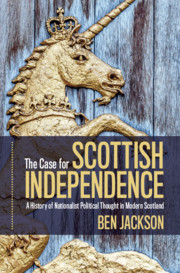Book contents
- The Case for Scottish Independence
- The Case for Scottish Independence
- Copyright page
- Dedication
- Contents
- Acknowledgements
- Abbreviations
- Introduction
- 1 The Ideology of Early Scottish Nationalism
- 2 A Democratic Nation
- 3 Britain in Decline
- 4 The Case for Left-Wing Nationalism
- 5 Sovereignty and Post-Sovereignty
- Conclusion
- Select Bibliography
- Index
5 - Sovereignty and Post-Sovereignty
Published online by Cambridge University Press: 20 June 2020
- The Case for Scottish Independence
- The Case for Scottish Independence
- Copyright page
- Dedication
- Contents
- Acknowledgements
- Abbreviations
- Introduction
- 1 The Ideology of Early Scottish Nationalism
- 2 A Democratic Nation
- 3 Britain in Decline
- 4 The Case for Left-Wing Nationalism
- 5 Sovereignty and Post-Sovereignty
- Conclusion
- Select Bibliography
- Index
Summary
This chapter focuses on the concept of sovereignty and the twofold role it has played in nationalist thought. First, the chapter shows that an increasingly important argument for independence has been that a long-standing Scottish tradition of popular sovereignty is fundamentally in tension with the English notion of parliamentary sovereignty. Indeed, a rudimentary but highly effective argument for Scottish independence from the 1980s onwards was simply that in the absence of a Scottish state Scotland is often governed from Westminster by a party that the Scottish people did not vote for. On this account, Scottish independence is supported by the principles of democracy. But, second, the chapter also demonstrates that from the 1980s onwards Scottish nationalists frequently argued that the era of absolute state sovereignty had ended. Instead, an independent Scotland would be one among a whole raft of ‘post-sovereign’ European states, sharing membership of the European Union and pooling sovereignty where appropriate to advance their interests.
Keywords
- Type
- Chapter
- Information
- The Case for Scottish IndependenceA History of Nationalist Political Thought in Modern Scotland, pp. 128 - 160Publisher: Cambridge University PressPrint publication year: 2020

